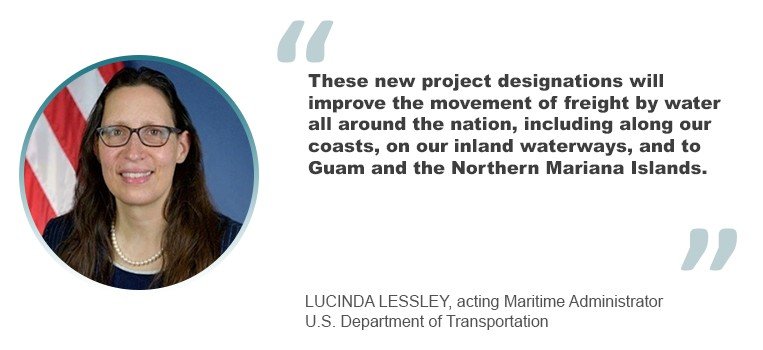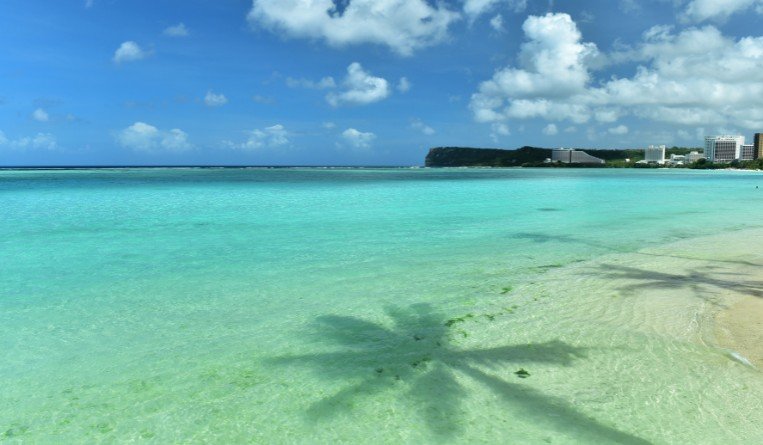The U.S. Department of Transportation’s Maritime Administration (MARAD) in August announced the designation of six new Marine Highway Projects and a new Marine Highway Route as part of the America’s Marine Highway Program (AMHP). The AMHP encourages the use of the country’s navigable waterways for the movement of freight and people as an alternative to land-based transportation.
Since its inception, the AMHP has designated 46 Marine Highway Projects. The designation makes projects on Marine Highway Routes eligible for grants when AMHP funding is available. In May, the department announced the availability of nearly US$11 million in grant funding through the AMHP, which will be awarded to previously designated advance marine highway projects.
“These new project designations will improve the movement of freight by water all around the nation, including along our coasts, on our inland waterways, and to Guam and the Northern Mariana Islands,” said acting Maritime Administrator Lucinda Lessley. “Making better use of our inland waterways can boost America’s maritime industry and create jobs while cutting emissions and traffic congestion.”
The new route designation involves Guam and the Commonwealth of the Northern Mariana Islands in the western Pacific. Designated route M-GNM1, this route designation will allow the expansion of existing containerized freight service between Guam and the Commonwealth of the Northern Mariana Islands’ (CNMI) main islands of Rota, Tinian, and Saipan. Nearly all commodities and household and commercial goods needed by local residents – including food, clothing, fuel, vehicles, construction materials, and medical supplies – are transported through the islands’ seaports.
Project designations include:
Guam Marine Transportation Enhancement Initiative. This designation will expand and promote inbound and outbound cargo within the islands. Service providers transporting freight utilize U.S. ports in Hawaii and the West Coast before making their way through Guam and the CNMI. The Port of Guam operates as the only commercial seaport on the island and serves the regional population of more than 225,000, including communities on the neighbouring islands in the CNMI.
CNMI Freight Improvement Project. The designation of the CNMI project will support the movement of containers between the Port of Guam and Commonwealth Port Authority ports of Saipan, Tinian, and Rota. The CNMI is exploring the expansion of its maritime capacities for the shipping of inter-island cargo and commodities to increase frequency and reduce shipping costs.
M-5 Coastal Connector (California/Oregon/Washington). This project designation will support a service transporting goods on barges between Bellingham, Washington; southern Oregon; and San Diego, California. This project would provide regional cargo interests with additional modal options, reducing truck traffic along Interstate 5.
Missouri River Container on Barge Project (Missouri): This designation will expand options for the transportation of goods on inland waterways, including agricultural commodities in containers originating within Central Missouri from ports and terminals along the M-29, M-70, and M-55 routes to ocean ports along the Gulf on the M-10. The service will help producers to reach international markets more competitively.
Port Raritan Terminal Facility (New Jersey): This designation will support service from the Raritan Port located in New Jersey to various locations in New York City, accommodating Roll-on/Roll-off (Ro-Ro) barges carrying wheeled containers, ferries capable of carrying trucks, Lift-on/Lift-off (Lo-Lo) barges that can be used to support offshore wind-energy turbines, and other services.
M-90 Transbay Freight Service Project (Wisconsin): This project will be the first in the AMHP intended to divert the transportation of large vessel modules and material-handling equipment from the highways to the waterways among Marinettte/Menominee, Sturgeon Bay, and Green Bay. The designation will help ensure the long-term sustainability and growth of the service and the provision of cost-effective shipping service for that region to sustain and create jobs.

Gregory Glass



